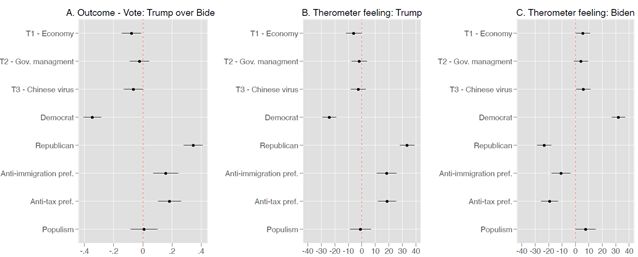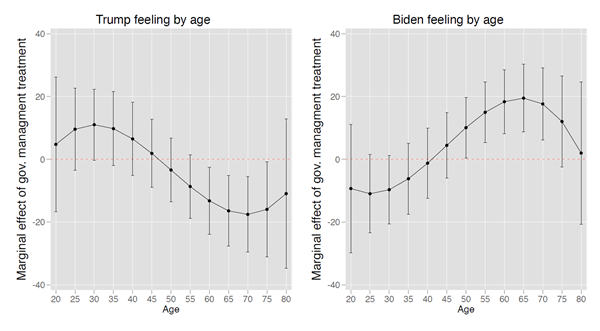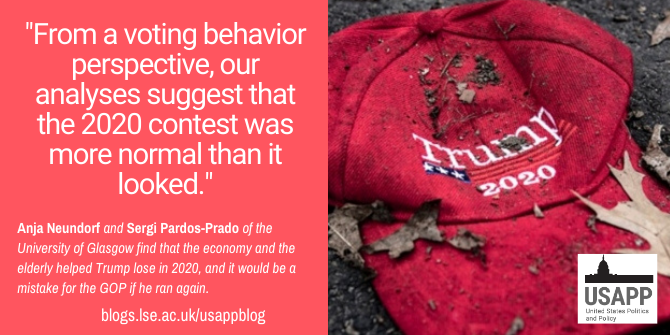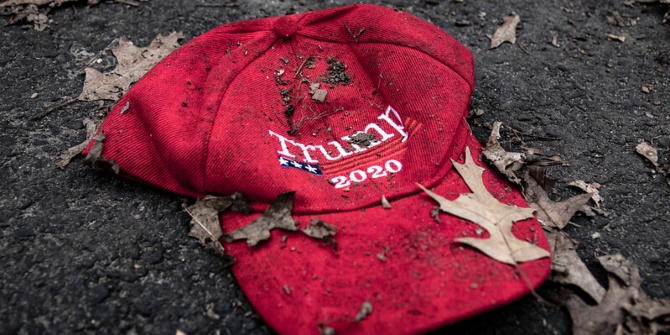
 In the years since Donald Trump’s presidential election victory, much has been written about how populists gain power. But what can Trump’s 2020 presidential election loss tell us about how populists stay in or lose power? Using a survey of 1,200 Americans, Anja Neundorf and Sergi Pardos-Prado find that despite being a populist, Trump was assessed and held to account by voters like any other incumbent. They write that his handling of the economy hurt Trump’s electoral prospects across all groups, and of the COVID-19 pandemic, especially among older Americans.
In the years since Donald Trump’s presidential election victory, much has been written about how populists gain power. But what can Trump’s 2020 presidential election loss tell us about how populists stay in or lose power? Using a survey of 1,200 Americans, Anja Neundorf and Sergi Pardos-Prado find that despite being a populist, Trump was assessed and held to account by voters like any other incumbent. They write that his handling of the economy hurt Trump’s electoral prospects across all groups, and of the COVID-19 pandemic, especially among older Americans.
The Trump Presidency caught social scientists by surprise. How could a populist outsider challenging core principles of liberal democracy reach such a powerful office against the expectations of so many? Since his election, political scientists have done a great job trying to make sense of the Trump phenomenon. Trump’s focus on immigration, ethnic and social identities, status threat, and economically vulnerable areas proved an electorally profitable strategy in 2016.
But while we understand now better how populists reach power, we still do not know much about how they stay in power. Some could argue that populists can keep their status as outsiders, and that they can get away with bad economic and political outcomes by blaming immigrants and the system. Another possibility is that they are held to account like any other politician, and that populists are not immune to the cost of governing.
Trump’s double status as both a populist outsider and a presidential incumbent during the COVID-19 crisis made this case particularly interesting. Our work reveals that he was assessed like any other incumbent, and that his populist appeals did not help at all. The unprecedented economic downturn significantly depressed Trump’s popular support across all partisan groups, and especially among middle-low and low-income respondents. Moreover, the poor public health record of the Trump administration (with one of the highest COVID-19-related death tolls in the world) reduced its electoral prospects among citizens between 55 and 70 years-old.
Punished for the economy, and by older voters
During the 2020 presidential election campaign, we ran a representative survey experiment with 1,200 Americans. In that experiment we randomly primed different groups of respondents on different aspects of the COVID-19 crisis: the unprecedented economic downturn in terms of job losses and fall in GDP, the COVID-19 death toll and public health management of the pandemic, and the Chinese origin of the virus and its spread through open borders. We then compared vote intentions in each of those groups with a control group that was not given any COVID-19-related story.
Figure 1 shows the statistical effect of some voting behavior drivers on voting for Trump over Biden, as well as on feelings for Trump on a thermometer scale, from colder to warmer, and on the same feelings for Biden. When the statistical estimate is further to the right, it means that the effect on voting was large. If the confidence intervals around the estimate overlap with the value 0, this means that effect probably did not exist.
Figure 1 – Priming people on aspects of the COVID-19 outbreak

Figure 1 shows that reminding respondents of the major economic downturn at the time significantly decreased voting intentions for Trump and increased them for Biden. The magnitude of the effect was quite large: the state of the economy decreased intentions to vote for Trump by 7 to 9 percentage points on average, and the results were not driven by any partisan group. We found no significant effects for the government’s management of the crisis nor the possible connection of the pandemic to immigration or ethnic threats. If anything, both versions of our primer text seemed to harm Trump, despite our expectation that framing the crisis as a “Chinese virus” might help him.
Even if the government’s record at managing the pandemic did not seem to have average effects on vote intentions, we looked at possible differences between age groups. After all, COVID-19 has proved to be more dangerous for older people. Figure 2 shows striking results. Respondents over 55 who were exposed to the performance primer text showed significantly less support for Trump compared to the control group. That same age group was close to 20 points more favorable to Biden. Given that older voters tend to support the Republican Party, the age effect of the pandemic was probably a key determinant of the outcome of the election.
Figure 2 – Feelings for Trump and Biden by age

A normal election, after all
The 2020 Presidential election did not feel normal. An atypical populist incumbent who refused to accept the electoral results, running in an unusually (and perhaps toxically) polarized political climate during a global pandemic. However, from a voting behavior perspective, our analyses suggest that the 2020 contest was more normal than it looked. A sitting President was held to account for a poor economic record at the time of the election, and voters rationally assessed his management of the pandemic according to how exposed they were to the fatal consequences of the virus. These results are consistent with well-established theories of economic voting and the politics of competence, and suggest that democratic accountability was at work.

“trampled Trump 2020” (CC BY-NC-SA 2.0) by Diane_Krauthamer
Figure 1 also shows that partisanship, anti-immigrant attitudes, and anti-tax policy preferences are among the strongest predictors of Trump support. Again, nothing necessarily unusual for a Republican presidential candidate. The importance of a low tax platform (which is often downplayed) and his vocal anti-immigration narrative are key determinants in understanding Trump’s electoral appeal. Interestingly, our measure of populist attitudes (i.e., preferences for people-centered decision mechanisms as opposed to politicians) had insignificant effects on Trump support. Our results are in line with recent research questioning the importance of populist attitudes when explaining the electoral success of nativist candidates.
The future of the GOP
The 2020 experience can inform the strategy of the Republican Party in the years to come. The first option for the party in upcoming elections is to opt for a mainstream candidate, but to strengthen the coalition between disaffected working classes and traditional conservatism, including pro-business and religious constituencies. This formula would involve stressing political competence but also anti-immigration platforms, conservative cultural values, and low-tax platforms. The second option is to revive the multicultural and conservative coalition that, at least on paper, the Republican party advocated in the early 2000s. This would be an anti-racist platform, trying to attract both white and ethnic minority voters with conservative attitudes. The racial divides in voting behavior and current climate, however, make this option highly unlikely.
The last option is to keep the populist and far right elements of Trumpism, which could include his own comeback. Our findings show that this would be a strategic mistake. While vocal anti-immigrant attitudes do indeed have strong electoral appeal, there is no evidence that populist and anti-systemic attitudes are a winning formula when seeking re-election. It is important not to confuse restrictive immigration policies with anti-liberal democratic policies. While the former have strong appeal in the US and elsewhere, the latter have not proved yet a good strategy in the long run. After all, our experiment suggests that political outsiders can face particularly high governing costs and be scrutinized on political competence once in power. Our work implies that populist illiberal leaders will not necessarily be able to systematically elude democratic accountability in the future.
- This article is based on the paper, ‘The Impact of COVID-19 on Trump’s Electoral Demise: The Role of Economic and Democratic Accountability’, in Perspectives on Politics.
Please read our comments policy before commenting.
Note: This article gives the views of the author, and not the position of USAPP – American Politics and Policy, nor the London School of Economics.
Shortened URL for this post: https://bit.ly/39jGZGb
About the author
 Anja Neundorf – University of Glasgow
Anja Neundorf – University of Glasgow
Anja Neundorf is Professor of Politics and Research Methods at the School of Social and Political Sciences at the University of Glasgow (Anja.Neundorf@glasgow.ac.uk). She previously held a position at the University of Nottingham (2013–2019) and a Post-doctoral Prize Research Fellowship in political science at Nuffield College, University of Oxford (2010-2012). She received her PhD from the University of Essex in 2010. Her research interests lie at the intersection of political behaviour, research methods, and comparative politics. She is currently working on an ERC Consolidator Grant “Democracy under Threat: How Education Can Save it” (DEMED).
 Sergi Pardos-Prado – University of Glasgow
Sergi Pardos-Prado – University of Glasgow
Sergi Pardos-Prado is Professor of Comparative Politics at the School of Social and Political Sciences at the University of Glasgow (Sergi.Pardos-Prado@glasgow.ac.uk). Before this, he was Associate Professor in Politics at Merton College, University of Oxford (2013–2019) and a Post-doctoral Prize Research Fellow in Political Science at Nuffield College, University of Oxford (2010–2013). He received his PhD from the European University Institute in 2010. His research interests lie at the intersection of political behaviour, comparative politics, political economy, and quantitative methods.



